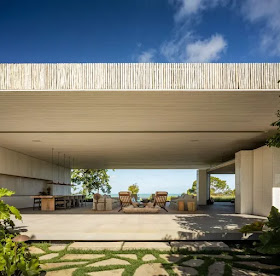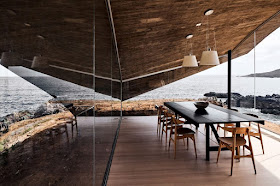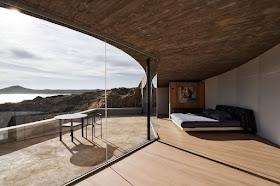It was the adjacency of the reports that promoted the idea - oligarchitecture. There was a report on a beach house that looked nothing like a classic, modest beach shack with quaint character, but rather a marvel of a beach mansion with exotic style - 'beyond expectations' as company mission statements like to boast – see: https://www.dezeen.com/2022/03/24/studio-mk27-vista-house-giant-roof-brazil/.
The next report was on oligarchs, their yachts; and then there were more. The thought was: what was the difference between expensive yachts and costly beach homes? The yacht was a marvel well beyond expectations too, both in style and cost: see - https://www.businessinsider.com/russian-oligarch-billionaire-alexei-kuzmichev-super-yachts-seized-france-authorities-2022-3; as well as
https://www.youtube.com/watch?v=NWk59fjsY1M.
Both reports seemed to bleat on about the excesses of excessive excess and private indulgences. One has to ask: has architecture become only a matter of individual, grand excess? Was Pevsner right: bicycle sheds are not architecture, but Lincoln Cathedral is - suggesting that excesses, extravagance, and extremes are essential for architecture; that architecture can never be simple or modest?
There are many published projects that show built extremes, either in style or size, grandeur, or both. One is left wondering if all preferred classifications of architecture are now oligarchitecture, and that 'architecture' is truly merely for metaphorical purposes, only to be used in any context except architecture that should really be labelled as 'oligarchitecture' - ripper grand designs! McCloud would be more than pleased with the idea that architecture involved bespoke, exotic expense and rich indulgences for him to espouse.
One could be forgiven for believing this proposition, not only because 'architecture' as a word is now used for all purposes that have nothing to do with building. We hear 'architecture' used in just about any context when a sense of controlling authority and stylish power is needed, or intended to be promoted in an authoritative, learned manner;+ a little like the use of 'segue,' instead of saying, "this leads us into the matter of . . " - see: https://voussoirs.blogspot.com/2021/08/the-fractal-world-of-design.html. The term comes from film and music, but it has achieved an 'intellectual' status when used more generally, just like 'architecture.'
The other reason to think that architecture has now become oligarchitecture is that the world is full of examples of extreme projects promoted as being better than ' the bee's knees' – worthy of everyone’s attention. It seems as though projects have to be of this ilk if they are to even be considered for publication. There is something of a self-fulfilling prophecy here, ensuring that architecture must be oligarchitecture to be relevant.
We usually see unusual, astonishing, smart buildings that can only have come into being because of generous, indulgent clients with huge budgets, to give us astonishing and remarkable, different, extreme outcomes for our amazement, just like the oligarch's yachts. The everyday is something to be ignored unless it has been adopted by the oligarchical few, like torn jeans and cheap reproductions, things once to be endured only by the poor that have now become extremely high fashion - both high priced and labelled for oligarchs, or those who would like to be.
Howard Davis's text# on the cathedral and the bicycle shed – see: https://www.acsa-arch.org/proceedings/Annual%20Meeting%20Proceedings/ACSA.AM.83/ACSA.AM.83.30.pdf - needs to be read in this context if one is to learn how the Pevsner proposition is wrong. We need to try to understand how architectural outcomes can be simple, basic, and modest, because these are the roots of the extremes that we are now wanting to categorise more appropriately as oligarchitecture, because they are bespoke, exotic and indulgent in a way that distorts and re-frames simple beginnings, origins that are ignored as irrelevant.
We need to discover ways of encouraging true architecture, not to promote oligarchitecture; we need ways of maintaining the simple modesty in rich complexities rather than using riches, private or public wealth, to create unique extremities that fit the category oligarchitecture, because these only alienate, divide.
Maybe we do have to learn how to make cathedrals out of sheds*: see – e.g. https://voussoirs.blogspot.com/2020/02/a-tin-chapel-brora-episcopal-church.html - to give us true architecture rooted in meaning and substance rather than stark elitism that only builds differences as a great divide. Great architecture has nothing to do with this world of oligarchs; good architecture knits society, strengthens it as a communal gesture. The world of oligarchs only gives the finger to the rest of the world that it seems happy to ignore in favour of its bespoke, oligarchical self-expression, seeking to impress everyone else with an aloof, gross extravagance.
We need architecture that is both bicycle shed and cathedral, not grand, oligarchical designs that create a private world for multi-billionaires who can do whatever, whenever, and are happy to display their whimsy for all to drool over and envy as they indulge in their competitive fantasies as grand exhibitions that include oligarchitecture.
#
83RD ACSA ANNUAL MEETING . HISTORY . THEORY/CRITIClSM . 1995
The Cathedral and the Bicycle Shed HOWARD DAVIS University of Oregon
https://www.acsa-arch.org/proceedings/Annual%20Meeting%20Proceedings/ACSA.AM.83/ACSA.AM.83.30.pdf
*
31 MARCH 2022
A few examples of corrugated iron ‘shed cathedrals’ that illustrate Howard Davis's theory of development from traditionally simple to more complex solutions:
https://voussoirs.blogspot.com/2020/02/a-tin-chapel-brora-episcopal-church.html
https://voussoirs.blogspot.com/2014/10/the-corrugated-iron-cathedral.html
+
31 MARCH 2022
The following is a listing taken from Zubal Books under the category: 'Architecture':
The Architecture of Molecules
Linus Pauling & Roger
Hayward / San Francisco: Freeman & Company 1964
first
edition, first printing; hardcover, very good in a worn dust jacket.
Volumes Included: 1
ISBN: 0716701588
Subject/Keywords:
chemistry physics pbs
This listing reminds one of a bookshop that had Dante's Divine Comedy filed under 'Humour.'
16 APRIL 22
Another grand, 'architectural,' coastal retreat: see - https://www.dezeen.com/2020/07/13/house-in-los-vilos-chile-ryue-nishizawa/
.jpg)





.jpg)






.jpg)


.jpg)
.jpg)
.jpg)
.jpg)
.jpg)
.jpg)

.jpg)
.jpg)
.jpg)
.jpg)
.jpg)
.jpg)
.jpg)
.jpg)
.jpg)
.jpg)
.jpg)
.jpg)

.jpg)
.jpg)
.jpg)
.jpg)
.jpg)

.jpg)




.JPG)
.JPG)









